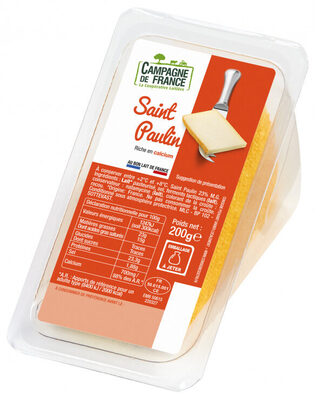
Barcode: 3265776711391
Saint paulin
HALAL
📝 Reason: After analyzing all ingredients in Saint Paulin cheese, they are derived from Halal sources: the milk, salt, lactic ferments, and natamycin (E235, allowed per Halal_ECodes_list). No Haram (forbidden) or Doubtful substances are found, and none require Halal certification. According to Quran 5:3 and IFANCA rulings, these components are Halal unless cross-contamination or specifically Haram sources are used, which is not indicated here.
🏷️ Category: Dairies, Fermented Foods, Fermented Milk Products, Cheeses, Saint Paulin Cheese
📄 Certificates: High In Calcium, Nutriscore, Nutriscore Grade D, Fr:Triman, Vegetarisch
Ingredients:
Details
Understanding the Halal Status of Saint Paulin Cheese
When it comes to dairy products, especially cheese, one may wonder about their Halal status. Today, we delve into Saint Paulin cheese, a delightful choice from the category of fermented dairy products. We will analyze its ingredients, the Halal compliance of its components, and provide important insights based on Islamic guidelines.
What is Saint Paulin Cheese?
Saint Paulin cheese is a semi-soft cheese originating from France, renowned for its creamy texture and mild flavor. It is widely enjoyed on cheese boards and paired with various dishes, making it a favorite among cheese lovers.
Ingredients Breakdown
The ingredients of Saint Paulin cheese include:
- Pasteurized milk
- Salt
- Lactic ferments (milk)
- Preservative: natamycin (E235)
Now, let’s explore each ingredient to assess its Halal status.
1. Pasteurized Milk
Pasteurized milk is made from cow’s milk that has undergone pasteurization, a process that heats the milk to eliminate harmful bacteria. Generally, plain milk is considered Halal, provided it does not contain Haram additives or animal rennet. In the case of Saint Paulin, there’s no indication of any non-Halal processing, confirming its Halal status.
2. Salt
Salt, a natural mineral, is universally accepted as Halal. It does not come from animal sources, and there is no risk of contamination. Thus, salt in Saint Paulin cheese poses no Halal concern.
3. Lactic Ferments (Milk)
Lactic ferments are cultures used in the fermentation process of cheese, typically derived from milk. As long as these cultures originate from Halal sources and are produced without Haram substances, they are considered Halal. For Saint Paulin cheese, there are no non-Halal issues noted.
4. Preservative: Natamycin (E235)
Natamycin, labeled as E235, is an antifungal preservative obtained from the fermentation of the bacterium Streptomyces natalensis. This substance is widely accepted as Halal since it is not derived from animals and is recognized in Halal E-codes. It plays a vital role in enhancing the shelf-life of the cheese.
So, Is Saint Paulin Cheese Halal?
Based on our analysis, Saint Paulin cheese is confirmed to be HALAL. None of the ingredients listed contain Haram or doubtful elements, and there are no indications of cross-contamination with forbidden substances. The ingredients meet the criteria outlined in Quran 5:3, and the rulings from trusted organizations such as IFANCA support this finding.
Conclusion
In summary, if you’re looking for a delicious and Halal cheese option, Saint Paulin is a superb choice. Always ensure to buy from reputable sources to maintain your Halal standards. With its rich taste and fulfilling properties, Saint Paulin cheese can be an excellent addition to your diet without compromising your beliefs. Enjoy the wonderful flavors while resting assured of its Halal certification!
